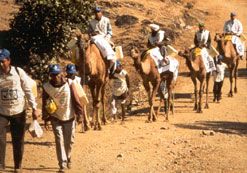Polio Plus History
About Our Club

Rotary's involvement in polio eradication began in 1979 with a five-year commitment to provide and help deliver polio vaccine to six million children of the Philippines. It was the first project of the new Health, Hunger, and Humanity (3-H) program. In the next four years, similar five-year commitments were approved for Haiti, Bolivia, Morocco, Sierra Leone, and Cambodia.
In the early 1980s, Rotary began planning for the most ambitious program in its history - to immunize all of world's children against polio. The plan required collaboration with international, national, and local health agencies and took shape early in Carlos Canseco's year as RI President in 1984-85 when he appointed the Polio 2005 Committee. Dr. Canseco invited Dr. Albert Sabin, developer of the oral polio vaccine, to serve as a special consultant to the committee.
Rotary's pledge of US$120 million to fund its PolioPlus program was announced in October 1985 at the 40th anniversary of the United Nations. This ambitious commitment electrified the global public health community. Within three years, Rotarians had more than doubled their fundraising goal, donating US$247 million. By the time the world is certified polio-free, Rotary's contributions to the global polio eradication effort will exceed US$600 million.
Rotary's role in polio eradication continues to evolve. Initially its role was that of a catalyst, providing money for vaccine and volunteer support to overcome problems associated with distribution. A Rotary Foundation grant funded a core group of polio experts at the World Health Organization (WHO), who have guided the global program. In more recent years, PolioPlus funds have funded transportation and other operational costs associated with vaccine delivery, surveillance efforts (including laboratory needs) to identify areas where the virus circulates, and training for healthcare workers and volunteers involved in the immunization process.
Rotarians have delivered vaccine by camels and helicopters, trucks and motorbikes, staffed immunization posts, raised community awareness of the value of immunization, and, in the process, helped to mobilize 10 million volunteers.
In 1995, Rotary launched a task force to advocate political and financial support for polio eradication to donor governments. Working in conjunction with the other spearheading partner agencies, these public sector advocacy efforts have resulted in mobilizing more than $1.5 billion in polio-specific grants.
In 2000, Rotary teamed up with the United Nations Foundation to carry a financial appeal to the private sector - foundations, corporations, and wealthy individuals.
As the war on polio enters its final phases, adequate funding is the No. 1 obstacle to achieving a polio-free world. In February 2002, Rotary rose to the challenge once again, announcing a Polio Eradication Fundraising Campaign to raise US$80 million to contribute to ongoing global polio eradication budget needs.
The Global Polio Eradication Initiative is recognized worldwide as a model of public and private cooperation in pursuit of a humanitarian goal. In the words of United Nations General Secretary Kofi Annan, "Rotary's PolioPlus program is a shining example of the achievements made possible by cooperation between the United Nations and non-governmental organizations."
In the early 1980s, Rotary began planning for the most ambitious program in its history - to immunize all of world's children against polio. The plan required collaboration with international, national, and local health agencies and took shape early in Carlos Canseco's year as RI President in 1984-85 when he appointed the Polio 2005 Committee. Dr. Canseco invited Dr. Albert Sabin, developer of the oral polio vaccine, to serve as a special consultant to the committee.
Rotary's pledge of US$120 million to fund its PolioPlus program was announced in October 1985 at the 40th anniversary of the United Nations. This ambitious commitment electrified the global public health community. Within three years, Rotarians had more than doubled their fundraising goal, donating US$247 million. By the time the world is certified polio-free, Rotary's contributions to the global polio eradication effort will exceed US$600 million.
Rotary's role in polio eradication continues to evolve. Initially its role was that of a catalyst, providing money for vaccine and volunteer support to overcome problems associated with distribution. A Rotary Foundation grant funded a core group of polio experts at the World Health Organization (WHO), who have guided the global program. In more recent years, PolioPlus funds have funded transportation and other operational costs associated with vaccine delivery, surveillance efforts (including laboratory needs) to identify areas where the virus circulates, and training for healthcare workers and volunteers involved in the immunization process.
Rotarians have delivered vaccine by camels and helicopters, trucks and motorbikes, staffed immunization posts, raised community awareness of the value of immunization, and, in the process, helped to mobilize 10 million volunteers.
In 1995, Rotary launched a task force to advocate political and financial support for polio eradication to donor governments. Working in conjunction with the other spearheading partner agencies, these public sector advocacy efforts have resulted in mobilizing more than $1.5 billion in polio-specific grants.
In 2000, Rotary teamed up with the United Nations Foundation to carry a financial appeal to the private sector - foundations, corporations, and wealthy individuals.
As the war on polio enters its final phases, adequate funding is the No. 1 obstacle to achieving a polio-free world. In February 2002, Rotary rose to the challenge once again, announcing a Polio Eradication Fundraising Campaign to raise US$80 million to contribute to ongoing global polio eradication budget needs.
The Global Polio Eradication Initiative is recognized worldwide as a model of public and private cooperation in pursuit of a humanitarian goal. In the words of United Nations General Secretary Kofi Annan, "Rotary's PolioPlus program is a shining example of the achievements made possible by cooperation between the United Nations and non-governmental organizations."